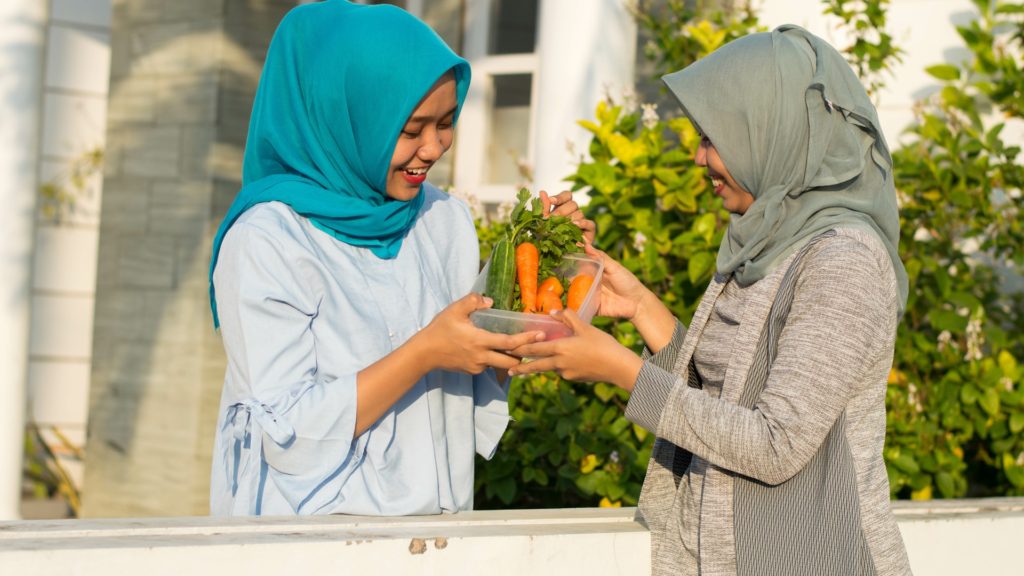Religion is Never Lived Alone

By Gracy Olmstead
Community life among real, broken, intentional people is where religious ideas become flesh.
As a child, I often accompanied my mother as she brought meals to members of our community. I remember conveying hot casseroles and crockpots full of stew to new mothers cradling tiny newborns, parents battling cancer, and families whose loved ones were in the hospital. In a magical serendipity, offering food usually turned into opportunities to share deeply-held hurts or fears. It offered us space to cry together, or to pray. Through simple, tangible offerings of food, we could be present with our neighbors—in particular, with those who might be struggling.
Though we hardly discern it beneath the body politic, religion is the heart that pumps blood to the members of the community.
I received early training in the communal callings of my faith. My parents, grandparents, and great-grandparents all partnered with local civic organizations and ministries to support their community. They joined hands with the local hospital, nursing homes, university, churches, mutual aid networks, and local ministries. In a broader popular culture that often encouraged me to think in an individualistic and materialistic manner—concerning myself primarily with my own comfort, purpose, and desires—my Christian faith, I realized, called me to more: to live in solidarity with others, to practice hospitality, and to seek the good of my neighbors. Each of these faith habits takes generations of care and cultivation to keep alive.
We often emphasize the personal aspects of religious faith. There’s good reason for this: our religious beliefs shape our core identity as humans, our understandings of the nature of the soul, of virtue and vice, and of the afterlife (among other things). But religious belief can—and, I would argue, should—have deep communal implications. Aristotle once argued that human beings were by nature “social animals.” And most religious faiths reflect this reality in one way or another. Christians believe that our God is “three in one,” a triune God, and thus forever in relationship within Himself. “If we truly believe in a God who exists as three beings in one, then we believe in a God who is relational,” Heidi Busse suggests. “Even in God’s self, God is in community.” As beings created “in the image of God,” we are thus made for fellowship—with God, first and foremost, but also with each other.
Religion is about people.
But it’s important to note that Christians are not just called to live in communion with those like them, or to foster civic relationships when it’s easy. In the writings of Old Testament prophets, in the Gospels, and the letters of the apostle Paul, we see that true Christian love and service stem from a belief in each person’s inherent dignity and worth as a child of God. We’re called to practice radical forms of compassion and generosity in our world: to live alongside the oppressed, the marginalized, and the poor. We are called to fight for justice and the common good, wherever we might live.
In the book of Isaiah, the prophet writes that God wants His people “to release the bonds of wickedness, to undo the ropes of the yoke, and to let the oppressed go free, and break every yoke … to break your bread with the hungry and bring the homeless poor into the house; when you see the naked, to cover him…”
In the gospel of Matthew, Christ similarly asks His followers to reject the comforts of the world in order to share God’s love, to be peacemakers in a world filled with violence and pain:
“’For I was hungry, and you gave Me something to eat; I was thirsty, and you gave Me something to drink; I was a stranger, and you invited Me in;naked, and you clothed Me; I was sick, and you visited Me; I was in prison, and you came to Me.’Then the righteous will answer Him, ‘Lord, when did we see You hungry, and feed You, or thirsty, and give You something to drink? …And the King will answer and say to them, ‘Truly I say to you, to the extent that you did it for one of the least of these brothers or sisters of Mine, you did it for Me.’”
The Gospels show us a God who lived in solidarity with the marginalized. Christ healed the leprous by touching them. He broke bread with society’s outcasts. Thus, my faith calls me to serve and love my community in sacrificial ways. I must love others as Christ loves them: wholeheartedly, no matter the personal cost. I must love others, too, because Christ loves them: if I truly love God, I will go where He goes, and serve where He serves.
Throughout history, we see examples of Christians whose lives were sculpted by this love: Dorothy Day spent over fifty years of her life living alongside New York City’s poor. William Wilberforce fought for the end of slavery until his dying breath. Fannie Lou Hamer was a pro-life civil rights activist who demonstrated radical hospitality to her neighbors and fought for the rights of black Americans in the Jim Crow South at immense personal cost. In each of these instances, personal faith led to civic action—to fellowship, service, and love in concrete ways.
As Wendell Berry suggests in his book The Unsettling of America, “To last, love must enflesh itself in the materiality of the world — produce food, shelter, warmth or shade, surround itself with careful acts, well-made things.” If our minds and thoughts are “on things above,” as the apostle Paul puts it in the book of Colossians, we’ll also live lives oriented toward justice, peace, and generosity in the towns and cities where we live.
I want to (as the prophet Jeremiah put it) “seek the peace and prosperity of the city to which I have carried you.” To do so, I must share the love of God with others. Perhaps this can happen through volunteer work with a local food pantry or soup kitchen, homeless ministry or nursing home. Some of us might be called to share our homes with those in need of shelter or respite; as Leah Libresco Sargeant recently wrote, “The home can be place of renewal, but it isn’t a retreat.”
Regardless, our faith should serve as the roots that nourish our community, and galvanize us to respond to tangible, local needs. In large ways and small, we can “enflesh” our love in place, and show our communities that we know what it means to be a good neighbor.
*****
Gracy Olmstead is a writer and journalist located outside Washington, D.C. Author most recently of Uprooted: Recovering the Legacy of the Places We’ve Left Behind, she has written for The New York Times, The Week, The Wall Street Journal, and The American Conservative among others. She is a Christian.
[This essay is part of a series called Positive Faith in Public Life]



